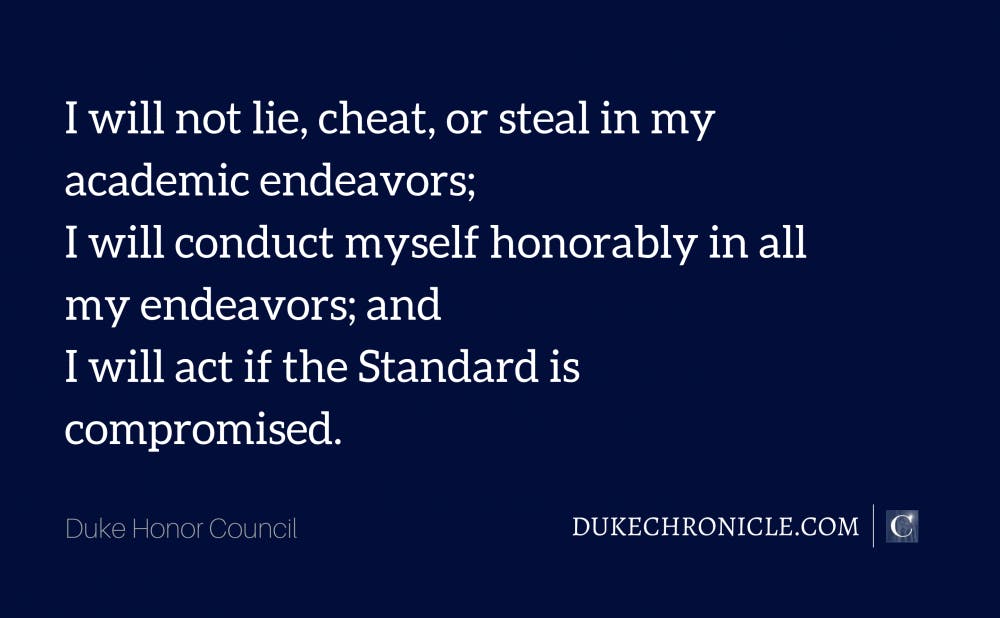In accepting admission to Duke University, students must agree to uphold the Duke Community Standard. On move-in day, students are given a freshly printed copy of “The Duke Community Standard in Practice.” First-years are asked to sign the Duke Community Standard banner at the welcoming ceremony of Orientation Week. The Duke Community Standard is displayed in classrooms across campus, it’s mentioned again on the syllabi distributed during the first week and students may be expected to agree to it again during exams. For some, it may seem like the Duke Community Standard is everywhere, and yet there are still hundreds of cases of misconduct each year.
The Duke Community standard is as follows:
I will not lie, cheat, or steal in my academic endeavors;
I will conduct myself honorably in all my endeavors; and
I will act if the Standard is compromised.
This commitment to honesty, fairness, respect, and accountability inside and outside the classrooms at Duke aims to build a strong community and encourage graduates to lead honorable lives beyond the university. It’s the goal of the Duke Honor Council to promote these principles across campus, but simply reminding students of the Duke Community Standard may not be enough; the Standard and the core values and principles behind it must be understood, internalized, and acted upon if we wish to turn ethical aspirations into realities.
To understand the Duke Community Standard, one must not only read each line carefully but also understand the history of the commitment and its role in the community. It’s a fairly new facet of the Duke community: we’ve discussed this history in previous columns. These details behind the Community Standard reveal that Duke is not an institution with a long-standing honor system, but that doesn’t excuse us from dishonorable behavior. Hence, the Community Standard
The first line of the Duke Community Standard is very straightforward, but it’s important to recognize that it extends beyond exams and graded assignments– we should not lie, cheat or steal on homework, research and all aspects of academia. Students most often encounter the Duke Community Standard inside the classroom, but the second line emphasizes its purview over all facets of life. A challenge with this line, however, is the definition of honorable conduct. In general, honorable actions are honest, fair or worthy of respect; think about whether your family or mentors would be proud of your behavior. The University outlines prohibited behaviors in the Duke Community Standard in Practice, but it’s also important to remember to think about whether your permitted behaviors are truly honorable. Finally, the Spring 2007 addition of the third line—the Obligation to Act—commits students to act when they see violations of the Duke Community Standard. Acting doesn’t require reporting in all cases, but it should aim to correct the situation, put the individual(s) involved back on track, and contribute to building a stronger Duke community in the process.
To internalize the Duke Community Standard, it should not only be understood but it should also be accepted at an individual level. Think about what it means to you, why it’s important, and how you can continue to uphold it every day. Internalizing these principles allows everyone to act honorably in all their endeavors and contribute to a stronger Duke community.
The Duke Honor Council is committed to building a stronger Duke community around the Duke Community Standard, and we hope that you will support our efforts! This year we’ll be focusing our work on projects inside and outside the classrooms at Duke and beyond to encourage community members to embody honor and integrity now and into the future. In addition to this year’s projects, we’ll be continuing our monthly programming events which culminates in our annual Integrity Week series in March. Moreover, this year’s biweekly columns will feature pieces written by council members on various topics relating to honor, integrity, and moral courage. Check out our website for more information about our group, our projects, and our upcoming events. Honor at Duke, however, is more than just our organization and its events; we hope to encourage dialogue on these topics and build a stronger community with you all in the process– come join us!
This week’s column was written by Trinity junior Nick Santangelo.
Correction: This column was updated Monday afternoon to reflect that Santangelo is a junior, not a senior as previously written. The Chronicle regrets the error.
Get The Chronicle straight to your inbox
Signup for our weekly newsletter. Cancel at any time.
Kushal Kudakia, President of Duke Honor Council, is a Trinity junior. his column for Duke Honor Council runs on alternate Fridays.

